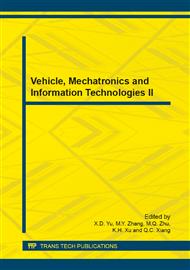[1]
Z. Pawlak. Rough Sets: International Journal of Computer and Information Sciences vol. 11(1982) pp.341-356.
Google Scholar
[2]
Z. Pawlak. Rough Sets: Theoretical Aspects of Reasoning about Data, Kluwer Academic Publishers, Boston, MA, (1991).
Google Scholar
[3]
D. Dubois, H. Prade. Rough Fuzzy Sets and Fuzzy Rough Sets: International Journal of General SystemVol. 17(1990) pp.191-208.
DOI: 10.1080/03081079008935107
Google Scholar
[4]
M. Banerjee, S.K. Pal. Roughness of a Fuzzy Set: Information SciencesVol. 93(1996) pp.235-246.
Google Scholar
[5]
M.D. Cock, C. Cornelis, E.E. Kerre. Fuzzy Rough Sets: The Forgotten Step, IEEE Transactions on Fuzzy Systems Vol. 15(2007) pp.121-130.
DOI: 10.1109/tfuzz.2006.889762
Google Scholar
[6]
R. Jensen, Q. Shen. Fuzzy Rough Sets Assisted Attribute Selection, IEEE Transactions on Fuzzy Systems Vol. 15(2007) pp.73-89.
DOI: 10.1109/tfuzz.2006.889761
Google Scholar
[7]
Sankar K. Pal, Pabitra Mitra. Case Generation Using Rough Sets with Fuzzy Representation: IEEE Transactions on Knowledge and Engineeringvol. 16, No. 3, arch (2004), p.292~300.
DOI: 10.1109/tkde.2003.1262181
Google Scholar
[8]
T.Y. Lin, Q. Liu. Rough Approximate Operators: Axiomatic Rough Set Theory, in: W. Ziarko(Ed. ), Rough Sets, Fuzzy Sets and Knowledge Discovery, Springer, Berlin, (1994), pp.256-260.
DOI: 10.1007/978-1-4471-3238-7_31
Google Scholar
[9]
G.L. Liu. The Axiomatization of the Rough Set Upper Approximation Operations, Fundamenta Informaticaevol. 69(2006) pp.331-342.
Google Scholar
[10]
J.S. Mi, W.X. Zhang. An Axiomatic Characterization of a Fuzzy Generalization of Rough Sets: Information Sciences vol. 160 (2004) pp.235-249.
DOI: 10.1016/j.ins.2003.08.017
Google Scholar
[11]
N.N. Morsi, M.M. Yakout. Axiomatics for Fuzzy Rough Sets: Fuzzy Sets and Systems vol. 100(1998) pp.327-342.
DOI: 10.1016/s0165-0114(97)00104-8
Google Scholar
[12]
S. Nanda, S. Majumdar. Fuzzy Rough Sets: Fuzzy Sets and Systems vol. 45(1992) pp.157-160.
DOI: 10.1016/0165-0114(92)90114-j
Google Scholar
[13]
D. Pei. A Generalized Model of Fuzzy Rough Sets: International Journal of General Systemvol. 34(2005) pp.603-613.
Google Scholar
[14]
Y.Y. Yao. Constructive and Algebraic Methods of the Theory of rough sets: Information Sciences vol. 109(1998) pp.21-47.
DOI: 10.1016/s0020-0255(98)00012-7
Google Scholar
[15]
Y.Y. Yao. Two Views of the Theory of Rough Sets in Finite universes: International Journal of Approximation Reasoning vol. 15(1996) pp.291-317.
DOI: 10.1016/s0888-613x(96)00071-0
Google Scholar
[16]
Y.Y. Yao. Relational Interpretations of Neighborhood Operators and Rough Set Approximation Operators: Information Sciences vol. 111(1998) pp.239-259.
DOI: 10.1016/s0020-0255(98)10006-3
Google Scholar
[17]
Y. Yao. Neighborhood Systems and Approximate Retrieval, Information Sciences vol. 176 (2007) pp.3431-3452.
DOI: 10.1016/j.ins.2006.02.002
Google Scholar
[18]
Y.Y. Yao, T.Y. Lin. Generalization of Rough Sets using Modal Logic: Intelligent Automation and Soft Computing, an International Journal vol. 2(1996) pp.103-120.
DOI: 10.1080/10798587.1996.10750660
Google Scholar
[19]
Ning Zhong, Andrzej Skowron. A Rough Set-based Knowledge Discovery Process: International Journal of Applied Mathematics and Computer Science. vol. 11(2001) pp.603-61.
Google Scholar


